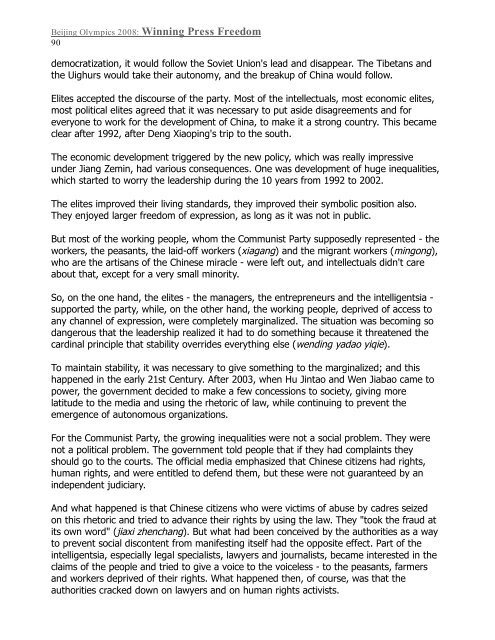Beijing Olympics 2008: Winning Press Freedom - World Press ...
Beijing Olympics 2008: Winning Press Freedom - World Press ...
Beijing Olympics 2008: Winning Press Freedom - World Press ...
You also want an ePaper? Increase the reach of your titles
YUMPU automatically turns print PDFs into web optimized ePapers that Google loves.
<strong>Beijing</strong> <strong>Olympics</strong> <strong>2008</strong>: <strong>Winning</strong> <strong>Press</strong> <strong>Freedom</strong><br />
90<br />
democratization, it would follow the Soviet Union's lead and disappear. The Tibetans and<br />
the Uighurs would take their autonomy, and the breakup of China would follow.<br />
Elites accepted the discourse of the party. Most of the intellectuals, most economic elites,<br />
most political elites agreed that it was necessary to put aside disagreements and for<br />
everyone to work for the development of China, to make it a strong country. This became<br />
clear after 1992, after Deng Xiaoping's trip to the south.<br />
The economic development triggered by the new policy, which was really impressive<br />
under Jiang Zemin, had various consequences. One was development of huge inequalities,<br />
which started to worry the leadership during the 10 years from 1992 to 2002.<br />
The elites improved their living standards, they improved their symbolic position also.<br />
They enjoyed larger freedom of expression, as long as it was not in public.<br />
But most of the working people, whom the Communist Party supposedly represented - the<br />
workers, the peasants, the laid-off workers (xiagang) and the migrant workers (mingong),<br />
who are the artisans of the Chinese miracle - were left out, and intellectuals didn't care<br />
about that, except for a very small minority.<br />
So, on the one hand, the elites - the managers, the entrepreneurs and the intelligentsia -<br />
supported the party, while, on the other hand, the working people, deprived of access to<br />
any channel of expression, were completely marginalized. The situation was becoming so<br />
dangerous that the leadership realized it had to do something because it threatened the<br />
cardinal principle that stability overrides everything else (wending yadao yiqie).<br />
To maintain stability, it was necessary to give something to the marginalized; and this<br />
happened in the early 21st Century. After 2003, when Hu Jintao and Wen Jiabao came to<br />
power, the government decided to make a few concessions to society, giving more<br />
latitude to the media and using the rhetoric of law, while continuing to prevent the<br />
emergence of autonomous organizations.<br />
For the Communist Party, the growing inequalities were not a social problem. They were<br />
not a political problem. The government told people that if they had complaints they<br />
should go to the courts. The official media emphasized that Chinese citizens had rights,<br />
human rights, and were entitled to defend them, but these were not guaranteed by an<br />
independent judiciary.<br />
And what happened is that Chinese citizens who were victims of abuse by cadres seized<br />
on this rhetoric and tried to advance their rights by using the law. They "took the fraud at<br />
its own word" (jiaxi zhenchang). But what had been conceived by the authorities as a way<br />
to prevent social discontent from manifesting itself had the opposite effect. Part of the<br />
intelligentsia, especially legal specialists, lawyers and journalists, became interested in the<br />
claims of the people and tried to give a voice to the voiceless - to the peasants, farmers<br />
and workers deprived of their rights. What happened then, of course, was that the<br />
authorities cracked down on lawyers and on human rights activists.





